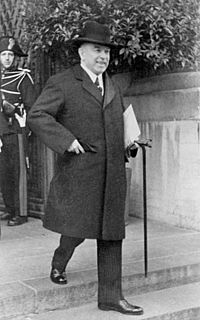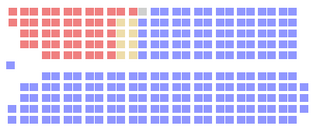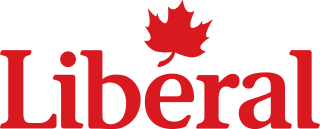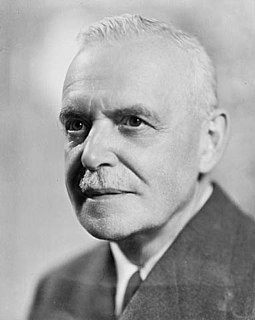
John George Diefenbaker was the 13th prime minister of Canada, serving from June 21, 1957 to April 22, 1963. He was the only Progressive Conservative party leader after 1930 and before 1979 to lead the party to an election victory, doing so three times, although only once with a majority of seats in the House of Commons of Canada.

The Progressive Conservative Party of Canada (PC) was a federal political party in Canada.

The Canadian federal election of 1997 was held on June 2 to elect members of the House of Commons of Canada of the 36th Parliament of Canada. Prime Minister Jean Chrétien's Liberal Party of Canada won a second majority government. The Reform Party of Canada replaced the Bloc Québécois as the Official Opposition.

The Canadian federal election of 1993 was held on October 25 of that year to elect members to the House of Commons of Canada of the 35th Parliament of Canada. Fourteen parties competed for the 295 seats in the House at that time. It was one of the most eventful elections in Canada's history, with more than half of the electorate switching parties from the 1988 election. The Liberals, led by Jean Chrétien, won a strong majority in the House and formed the next government of Canada.

The Canadian federal election of 1921 was held on December 6, 1921, to elect members of the House of Commons of Canada of the 14th Parliament of Canada. The Union government that had governed Canada through the First World War was defeated, and replaced by a Liberal government under the young leader William Lyon Mackenzie King. A new third party, the Progressive Party, won the second most seats in the election.

The Social Credit Party of Canada, colloquially known as the Socreds, was a conservative-populist political party in Canada that promoted social credit theories of monetary reform. It was the federal wing of the Canadian social credit movement.

The Canadian federal election of 1957 was held June 10, 1957, to select the 265 members of the House of Commons of Canada. In one of the great upsets in Canadian political history, the Progressive Conservative Party, led by John Diefenbaker, brought an end to 22 years of Liberal rule, as the Tories were able to form a minority government.

The Canadian federal election of 1968 was held on June 25, 1968, to elect members of the House of Commons of Canada of the 28th Parliament of Canada. The Liberal Party won a majority government under its new leader, Prime Minister Pierre Trudeau.

The Canadian federal election of 1980 was held on February 18, 1980, to elect members of the House of Commons of Canada of the 32nd Parliament of Canada. It was called when the minority Progressive Conservative government led by Prime Minister Joe Clark was defeated in the Commons.

The Canadian federal election of 1945 was the 20th general election in Canadian history. It was held June 11, 1945 to elect members of the House of Commons of Canada of the 20th Parliament of Canada. Prime Minister William Lyon Mackenzie King's Liberal government was re-elected to its third consecutive government, although this time with a minority government as the Liberals fell five seats short of a majority.

The Canadian federal election of 1979 was held on May 22, 1979, to elect members of the House of Commons of Canada of the 31st Parliament of Canada. It resulted in the defeat of the Liberal Party of Canada after 11 years in power under Prime Minister Pierre Trudeau. Joe Clark led the Progressive Conservative Party to power, but with only a minority of seats in the House of Commons. The Liberals, however, did beat the Progressive Conservatives in the overall popular vote by more than 400,000 votes.

The Canadian federal election of 1974 was held on July 8, 1974, to elect members of the House of Commons of Canada of the 30th Parliament of Canada. The governing Liberal Party was reelected, going from a minority to a majority government, and gave Prime Minister Pierre Trudeau his third term. The Progressive Conservatives, led by Robert Stanfield, did well in the Atlantic provinces, and in the West, but the Liberal support in Ontario and Quebec ensured a majority Liberal government.

During the history of Canadian politics, eleven minority governments have been elected at the federal level. There have also been two minority governments resulting from governments being replaced between elections, for a total of thirteen federal minority governments in twelve separate minority parliaments. There have been historical cases where the governing party had fewer than half of the seats but had the support of independents who called themselves members of the party; these cases are not included, as there was never any serious chance of the government falling.

The Canadian federal election of 1962 was held on June 18, 1962 to elect members of the House of Commons of Canada of the 25th Parliament of Canada. When the election was called, Progressive Conservative (PC) Prime Minister John Diefenbaker had governed for four years with the then-largest majority in the House of Commons in Canadian history.

The Canadian federal election of 1963 was held on April 8 to elect members of the House of Commons of Canada of the 26th Parliament of Canada. It resulted in the defeat of the minority Progressive Conservative (Tory) government of Prime Minister John Diefenbaker. For Social Credit, despite getting their highest ever share of the vote, the party lost 6 seats compared to its high-water mark in 1962.

The Canadian federal election of 1965 was held on November 8 to elect members of the House of Commons of Canada of the 27th Parliament of Canada. The Liberal Party of Prime Minister Lester B. Pearson was re-elected with a larger number of seats in the House. Although the Liberals lost a small share of the popular vote, they were able to win more seats, but fell just short of having a majority.

The Canadian federal election of 1935 was held on October 14, 1935. to elect members of the House of Commons of Canada of the 18th Parliament of Canada. The Liberal Party of William Lyon Mackenzie King won a majority government, defeating Prime Minister R. B. Bennett's Conservatives.

The Alberta general election of 1971 was the seventeenth general election in the Province of Alberta, Canada. It was held on August 30, 1971, to elect members of the Legislative Assembly of Alberta.























